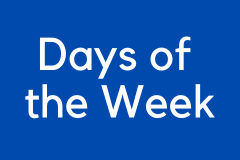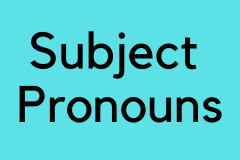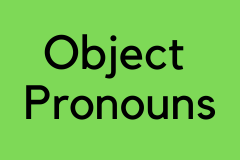Days of the Week
Learn how to use prepositions with days of the week.
Answer the following grammar questions.
Days of the Week
Point 1: Always spell the days of the week with a capital letter.
Example: We write Monday, not monday.
Example: We write Monday, not monday.
- Monday | on Monday
- Tuesday | on Tuesday
- Wednesday | on Wednesday
- Thursday | on Thursday
- Friday | on Friday
- Saturday | on Saturday
- Sunday | on Sunday
Point 2: In spoken English, we often drop the preposition "on" when talking about days.
Example: Both sentences below are correct.
✔️ I will see you Sunday.
✔️ I will see you on Sunday.
Example: Both sentences below are correct.
✔️ I will see you Sunday.
✔️ I will see you on Sunday.
Parts of the Day
Point 3: We use different prepositions for different parts of the day: in or at.
Use in for morning, afternoon, and evening.
Use at for noon, night, and midnight.
Use in for morning, afternoon, and evening.
Use at for noon, night, and midnight.
- morning | in the morning
- noon | at noon
- afternoon | in the afternoon
- evening | in the evening
- night | at night
- midnight | at midnight
Point 4: When you combine a day of the week and a part of the day, you do NOT need a preposition.
Exception: You must use at with noon and midnight.
Exception: You must use at with noon and midnight.
- I will see you Monday night.
- Let's meet Sunday afternoon.
- I will see you Friday at noon.
Parts of the Week
Point 5: The weekend is Saturday and Sunday.
The weekdays are Monday through Friday.
The weekdays are Monday through Friday.
- Weekend | on the weekend
- Weekday | on a weekday
- Weekdays | during the weekdays
About the Teacher
 My name is Todd Beuckens and I am an ESL teacher in Japan.
My name is Todd Beuckens and I am an ESL teacher in Japan.
I created this site to provide teachers and students free audio lessons and learning materials not usually found in commercial textbooks.










